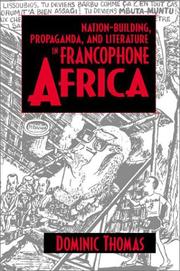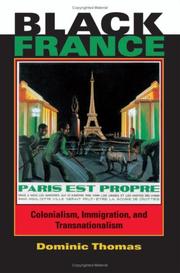| Listing 1 - 10 of 33 | << page >> |
Sort by
|
Book
Year: 2009 Publisher: Oxford Oxford University Press
Abstract | Keywords | Export | Availability | Bookmark
 Loading...
Loading...Choose an application
- Reference Manager
- EndNote
- RefWorks (Direct export to RefWorks)
Colonisation. Decolonisation --- Sociolinguistics --- Thematology --- Comparative literature --- French literature (outside France) --- Africa

ISBN: 0253215544 0253341574 9786612063084 1282063081 0253106443 025310954X 9780253109545 9780253106445 9781282063082 9780253341570 9780253215543 6612063084 Year: 2002 Publisher: Bloomington Indiana University Press
Abstract | Keywords | Export | Availability | Bookmark
 Loading...
Loading...Choose an application
- Reference Manager
- EndNote
- RefWorks (Direct export to RefWorks)
What characterizes the relationship between literature and the state? Should literature serve the needs of the state by constructing national consciousness, espousing state propaganda, and molding good citizens. Or should it be dedicated to a different kind of creative social endeavor? In this important book about literature and the politics of nation-building, Dominic Thomas assesses the contributions of Francophone African writers whose works have played a key role in the recent transition to democracy in the Congo. Exploring the works of Sony Labou Tansi, Henri Lopes, and Emmananuel Do
International relations. Foreign policy --- Africa --- African literature (French) --- History and criticism --- Nationalism and literature --- Africa [French-speaking ] --- Politics and literature --- Propaganda --- Communication in politics --- Political psychology --- Social influence --- Advertising --- Persuasion (Psychology) --- Psychological warfare --- Public relations --- Publicity --- Social pressure --- Literature --- Literature and politics --- Literature and nationalism --- Political aspects --- History and criticism.
Book
ISBN: 9780415561358 0415561353 9780415637480 Year: 2009 Publisher: Amsterdam : Routledge,
Abstract | Keywords | Export | Availability | Bookmark
 Loading...
Loading...Choose an application
- Reference Manager
- EndNote
- RefWorks (Direct export to RefWorks)
#SBIB:39A5 --- #SBIB:316.7C324 --- Kunst, habitat, materiële cultuur en ontspanning --- Culturele infrastructuur: musea --- Museology --- Sociology of culture --- Belgium --- France --- Great Britain

ISBN: 9786612073007 1282073001 0253112214 9780253112217 6612073004 9781282073005 0253348218 0253218810 9780253218810 9780253348210 Year: 2007 Publisher: Bloomington Indiana University Press
Abstract | Keywords | Export | Availability | Bookmark
 Loading...
Loading...Choose an application
- Reference Manager
- EndNote
- RefWorks (Direct export to RefWorks)
""[W]ithout a doubt one of the most important studies so far completed on literature in French grounded in the experiences of migrants of sub-Saharan African origin."" -- Alec Hargreaves, Florida State University France has always hosted a rich and vibrant black presence within its borders. But recent violent events have raised questions about France's treatment of ethnic minorities. Challenging the identity politics that have set immigrants against the mainstream, Black France explores how black
Multiculturalism --- Africans --- Blacks --- Ethnology --- Negroes --- Social conditions. --- Race identity --- France --- Ethnic relations. --- Noirs --- Africains --- Multiculturalisme --- Identité ethnique --- Conditions sociales --- Relations interethniques --- Black persons --- Black people --- Social conditions
Book
ISBN: 0253007038 1283994100 9780253007032 0253006694 9780253006691 9781283994101 0253006708 9780253006707 Year: 2013 Publisher: Bloomington
Abstract | Keywords | Export | Availability | Bookmark
 Loading...
Loading...Choose an application
- Reference Manager
- EndNote
- RefWorks (Direct export to RefWorks)
Africa and France reveals how increased control over immigration has changed cultural and social production, especially in theatre, literature, film, and even museum construction. A hated of foreigners, accompanied by new forms of intolerance and racism, has crept from policy into popular expressions of ideas about the postcolony and ethnic minorities. Dominic Thomas's stimulating and insightful analyses unravel the complex cultural and political realities of longstanding mobility between Africa and Europe and question the attempt at placing strict limits on what it means to be French or European
Postcolonialism --- Racism --- Multiculturalism --- National characteristics, French. --- Africans --- Post-colonialism --- Postcolonial theory --- Political science --- Decolonization --- French national characteristics --- Ethnology --- Cultural assimilation --- France --- Africa --- Eastern Hemisphere --- Bro-C'hall --- Fa-kuo --- Fa-lan-hsi --- Faguo --- Falanxi --- Falanxi Gongheguo --- Faransā --- Farānsah --- França --- Francia (Republic) --- Francija --- Francja --- Francland --- Francuska --- Franis --- Franḳraykh --- Frankreich --- Frankrig --- Frankrijk --- Frankrike --- Frankryk --- Fransa --- Fransa Respublikası --- Franse --- Franse Republiek --- Frant︠s︡ --- Frant︠s︡ Uls --- Frant︠s︡ii︠a︡ --- Frantsuzskai︠a︡ Rėspublika --- Frantsyi︠a︡ --- Franza --- French Republic --- Frencisc Cynewīse --- Frenska republika --- Furansu --- Furansu Kyōwakoku --- Gallia --- Gallia (Republic) --- Gallikē Dēmokratia --- Hyãsia --- Parancis --- Peurancih --- Phransiya --- Pransiya --- Pransya --- Prantsusmaa --- Pʻŭrangsŭ --- Ranska --- República Francesa --- Republica Franzesa --- Republika Francuska --- Republiḳah ha-Tsarfatit --- Republikang Pranses --- République française --- Tsarfat --- Tsorfat --- Γαλλική Δημοκρατία --- Γαλλία --- Франц --- Франц Улс --- Французская Рэспубліка --- Францыя --- Франция --- Френска република --- פראנקרייך --- צרפת --- רפובליקה הצרפתית --- فرانسه --- فرنسا --- フランス --- フランス共和国 --- 法国 --- 法蘭西 --- 法蘭西共和國 --- 프랑스 --- France (Provisional government, 1944-1946) --- Emigration and immigration --- Race relations.
Book
ISBN: 1443870145 9781443870146 9781443866620 1443866628 1322215820 Year: 2014 Publisher: Newcastle upon Tyne
Abstract | Keywords | Export | Availability | Bookmark
 Loading...
Loading...Choose an application
- Reference Manager
- EndNote
- RefWorks (Direct export to RefWorks)
Literary production is increasingly shaped by globalization and the complex nature of cultural, political, and social interaction. As such, longstanding colonial and postcolonial relations between Africa and Europe have yielded a range of challenging questions, and new generations of writers with roots in Africa have invariably found themselves navigating new geographic terrains and negotiating racialized identities, while simultaneously exploring the potential of literature in addressing the...
African literature. --- Authors, African. --- African authors --- African literature --- Black literature (African) --- Authors, African
Book
Year: 2013 Publisher: London: Sage,
Abstract | Keywords | Export | Availability | Bookmark
 Loading...
Loading...Choose an application
- Reference Manager
- EndNote
- RefWorks (Direct export to RefWorks)
Book
Year: 1965 Publisher: Washington (D.C.) : Thomist press,
Abstract | Keywords | Export | Availability | Bookmark
 Loading...
Loading...Choose an application
- Reference Manager
- EndNote
- RefWorks (Direct export to RefWorks)
Book
ISBN: 9781405198790 1405198796 1118917359 1782684395 1283268337 1444342789 1444331957 9786613268334 1444342754 1444342762 1444342770 Year: 2011 Publisher: Chichester, West Sussex Malden, MA : Wiley-Blackwell,
Abstract | Keywords | Export | Availability | Bookmark
 Loading...
Loading...Choose an application
- Reference Manager
- EndNote
- RefWorks (Direct export to RefWorks)
"A Companion to Comparative Literature presents a collection of more than thirty original essays from established and emerging scholars, which explore the history, current state, and future of comparative literature. Features over thirty original essays from leading international contributors Provides a critical assessment of the status of literary and cross-cultural inquiry Addresses the history, current state, and future of comparative literature Chapters address such topics as the relationship between translation and transnationalism, literary theory and emerging media, the future of national literatures in an era of globalization, gender and cultural formation across time, East-West cultural encounters, postcolonial and diaspora studies, and other experimental approaches to literature and culture"--
Comparative Literature --- Comparative literature. --- Littérature comparée
Book
ISBN: 9780253024329 9780253024411 0253024412 0253024323 Year: 2016 Publisher: Bloomington
Abstract | Keywords | Export | Availability | Bookmark
 Loading...
Loading...Choose an application
- Reference Manager
- EndNote
- RefWorks (Direct export to RefWorks)
In 1994, the Akazu, Rwandan's political elite, planned the genocidal mass slaughter of 500,000 to 1,000,000 Tutsi and Hutu who lived in the country. Given the failure of the international community to acknowledge the genocide, in 1998, ten African authors visited Rwanda in a writing initiative that was an attempt to make partial amends. Abdourahman A. Waberi claims, "Language remains inadequate in accounting for the world and all its turpitudes, words can never be more than unstable crutches, staggering along . . . And yet, if we want to hold on to a glimmer of hope in the world, the only miraculous weapons we have at our disposal are these same clumsy supports." Shaped by the author's own experiences in Rwanda and by the stories shared by survivors, Harvest of Skulls stands twenty years after the genocide as an indisputable resource for discussions on testimony and witnessing, the complex relationship between victims and perpetrators, the power of the moral imagination, and how survivors can rebuild a society haunted by the ghost of its history.--
French literature (outside France) --- National movements --- Sociology of culture --- anno 1990-1999 --- Rwanda --- Genocide --- Tutsi (African people) --- Hutu (African people) --- Crimes against --- Ethnic relations. --- Bahutu --- Banyaruanda (African people) --- Banyarwanda (African people) --- Lera (African people) --- Ndara (African people) --- Ndoga (African people) --- Ndogo (African people) --- Ruanda (African people) --- Rwanda (African people) --- Shobyo (African people) --- Tshogo (African people) --- Ethnology --- Rundi (African people) --- Banyamulenge (African people) --- Batusi (African people) --- Batutsi --- Mulenge (African people) --- Tusi (African people) --- Tussi (African people) --- Tuti (African people) --- Watusi (African people) --- Watutsi (African people)
| Listing 1 - 10 of 33 | << page >> |
Sort by
|

 Search
Search Feedback
Feedback About UniCat
About UniCat  Help
Help News
News